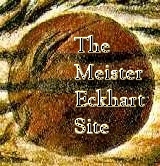|
|
||
 |
Meister Eckhart Home / Works by Meister Eckhart - Quotes / Inspired by Eckhart / Studies / The Papal Condemnation / Mail & Announcements / Links / Books |
AMY HOLLYWOOD
From: M. Rubin, W. Simons (ed.), The Cambridge History of Christianity, v. 4, Christianity in Western Europe, c. 1100 - c. 1500, Cambridge 2009 (Pages 297-307).
Page 6
The notion of a union of wills remains central to the theological articulation of mystical experience throughout the Middle Ages. Yet there is a counter-trend, one first visible in northern Europe in the late thirteenth and early fourteenth centuries (although there is evidence for similar views espoused contemporaneously south of the Alps). The beguines Hadewijch (c. 1250) and Marguerite Porete (d. 1310) and the Dominican Meister Eckhart (c. 1260–1328) suggest that complete union with God occurs when the soul not only overcomes its sinfulness, but also its very creatureliness or createdness. Hadewijch hints at this view in a vision in which an angel shows her an ideal, 'full grown' Hadewijch who is enclosed within the deity and who has never fallen into sin. [7] Marguerite Porete goes further, arguing that the truly free and annihilated soul – one who has not only overcome her own sin and will, but who has also destroyed reason, will and desire – exists there 'where she was before she was'. [8]
Meister Eckhart provides a Neoplatonic framework for such claims. In his commentary on the Prologue to the Gospel of John, Eckhart draws out his understanding of the self-birth of the Godhead, the external emanation of all things from the divine source, and the return of all things to God. Playing on the double meaning of the Latin term principium, Eckhart argues that the opening of the Gospel ('In principio') refers both to the temporal beginning of all things and to their source or principle. For Eckhart, following The Book of Causes and other Neoplatonic sources, that which 'is produced or proceeds from any thing is precontained in it' and 'it is preexistent in it as a seed in its principle'. [9] Moreover, that which proceeds not only pre-exists in its source, but also remains in its source 'just as it was in the beginning before it came to be'. [10] All created things, then, have their principle in an other and that principle remains in the other. All of creation has both a virtual and a formal aspect – it therefore has both coeternal and temporal relations to the divine. The grounds for the return of all things to their divine source lies here, for all things have their principle in the divine and, insofar as they remain uncreated with that divine ground, eternally participate in the self-birth of the Godhead and of all creation.
[7] Hadewijch, The Complete Works, trans. Mother Columba Hart (New York: Paulist Press, 1980), Vision 4, 274.
[8] Marguerite Porete, The Mirror of Simple Souls, trans. Edmund Colledge, J. C. Marler and Judith Grant (Notre Dame: University of Notre Dame Press, 1999), ch. 135, 712. Translation modified.
[9] Meister Eckhart, Meister Eckhart: The Essential Sermons, Commentaries, Treatises, and Defense, trans. Edmund Colledge and Bernard McGinn (New York: Paulist Press, 1981), 'Commentary on John', n. 4, 123.
[10] Ibid. , 124.